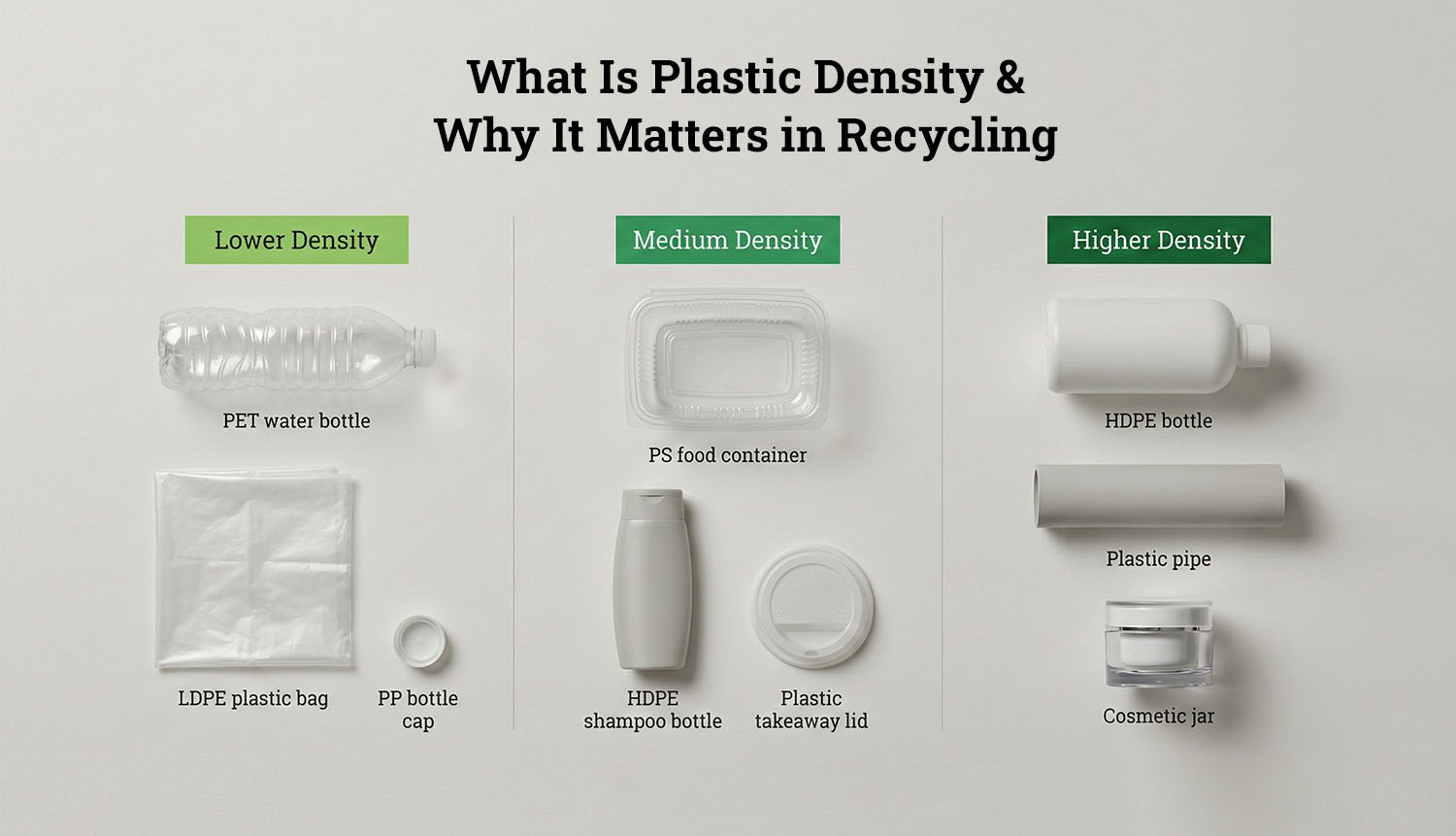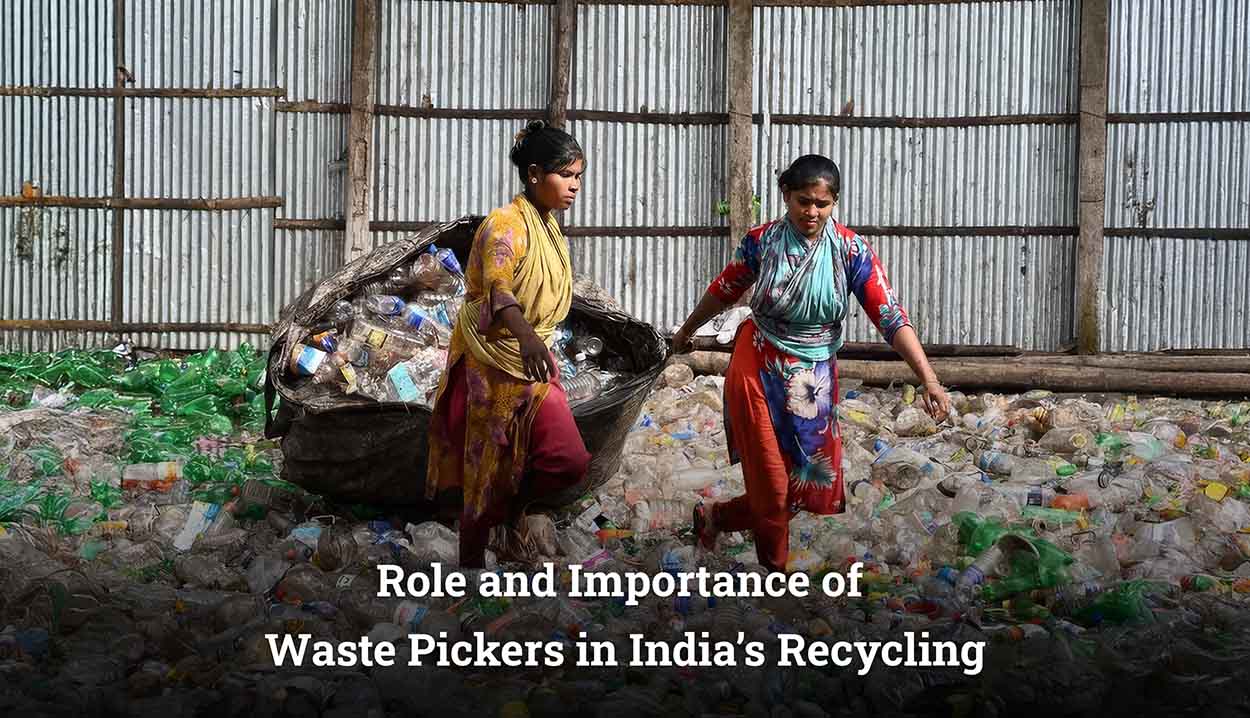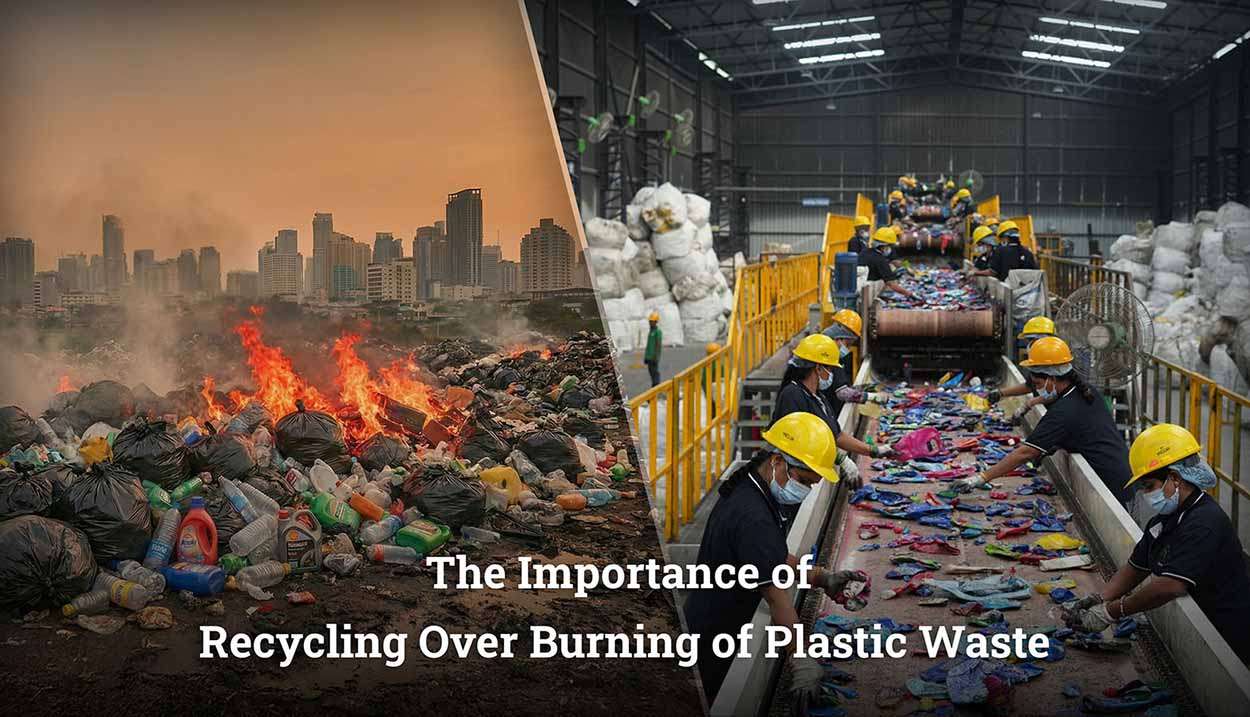Introduction
In recent years, India’s concern for sustainable waste management has grown significantly, sparking new sets of regulations for companies dealing with plastic packaging. At the heart of these rules is the principle of Extended Producer Responsibility, or EPR. But navigating PIBO EPR compliance in India isn’t always straightforward—especially for Producers, Importers, and Brand Owners (PIBOs) new to these mandates. Essentially, EPR makes PIBOs legally responsible for what happens to the plastic packaging they bring into the Indian market, from collection and recycling to responsible disposal.
For PIBOs, EPR is much more than a regulation to check off; it’s about demonstrating a true commitment to the environment and showing customers, you’re doing your part. The rules—drawn from the Plastic Waste Management (PWM) Rules, and their updates—outline specific steps every PIBO must follow, including registration, detailed plans, recycling targets, and plenty of paperwork. PIBO EPR compliance India isn’t just legal—it’s a practical shift toward a cleaner future, practical risk management, and a sign your business supports the movement for a circular economy.
Why EPR Matters for PIBOs in India
Understanding your exact EPR obligations is key to good business today. Beyond legal requirements, epr obligations give PIBOs solid reasons to help reduce India’s growing plastic waste problem.
- Meeting epr obligations isn’t just about rules; it builds trust among customers and partners, who increasingly value ethical and green brands.
- Strong EPR compliance helps PIBOs avoid costly fines or future disruption—regulations are only getting stricter.
- Following the EPR path can also open up global markets, as many buyers want to work with partners who have good producer responsibility policies.
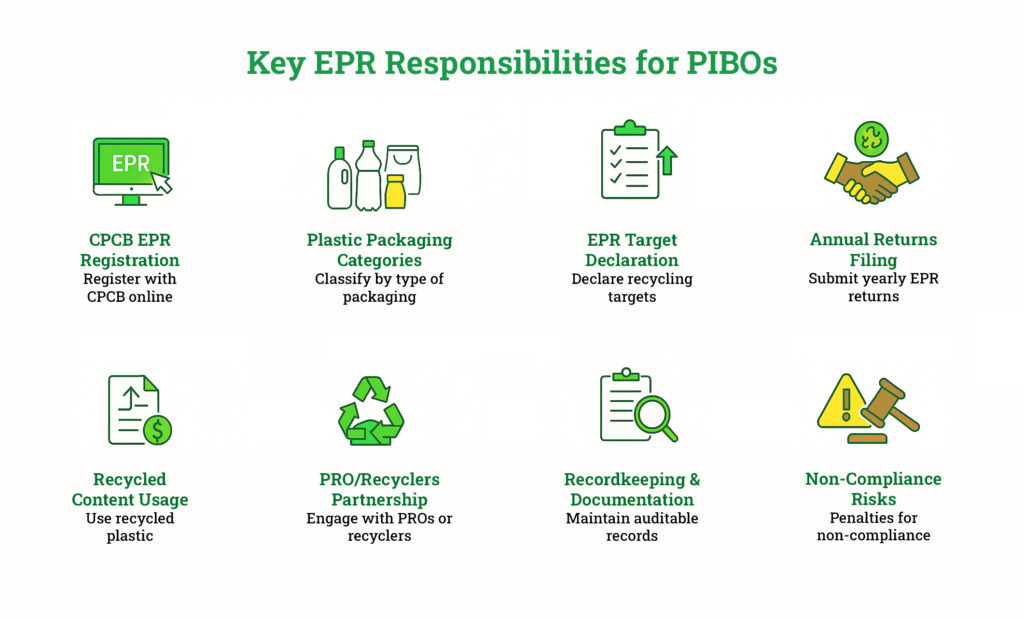
Key EPR Responsibilities for PIBOs
Every PIBO has to take certain steps to fulfill their producer responsibility obligations as set by the Indian government. Here’s what’s typically required for PIBO EPR compliance India:
Essential Producer Responsibility Obligations:
Register Online
All PIBOs need to register with either the Central or State Pollution Control Board, depending on where they operate.
Submit an EPR Plan
File a clear outline showing how you’ll collect, process, and recycle the plastics you put into the market.
Set and Meet Targets
Calculate your annual recycling commitment based on what you have sold over the last two years.
Work with Partners
Partner with Producer Responsibility Organizations (PROs), recyclers, or local bodies who help fulfill the obligations.
Increase Recycled Content
Gradually use more recycled plastic in your packaging, as scheduled by the rules.
Regular Reporting
Upload progress reports quarterly and annually through the EPR portal and keep all documents as proof.
Stay Audit-Ready
Be prepared for routine checks and make sure your registrations are kept up to date.
Producer responsibility obligations shouldn’t just sit on paper—they should shape your daily operations and business strategy.
Obligation for Recycling for PIBOs under EPR
A major pillar of EPR obligations for PIBOs is recycling. PIBOs must not just recover plastic, but also ensure it gets processed the right way. Here’s how the rules work:
- Required recycling quotas are set every year, based on the weight and type of plastics introduced during the previous two years.
- Only authorized, CPCB-approved recyclers count toward your targets—always get proper documentation.
- Innovation is encouraged! You can reduce your EPR obligations for PIBOs by redesigning packaging, using fewer layers, or integrating recycled content.
- The more these obligations are met, the more you help lighten your company’s impact on the environment.
Types of Plastic Packaging Covered Under EPR for PIBOs
Wondering which plastics fall under EPR? PIBO EPR compliance India means tracking all four major categories:
- Category I: Rigid packaging—think bottles, buckets, large containers.
- Category II: Flexible packaging, including single or multi-layer bags or wraps.
- Category III: Multilayered plastics, typically used in food or product packaging.
- Category IV: Certified compostable plastics, but only if they pass national compostability standards.
Proper accounting and planning for each type lets PIBOs develop accurate EPR action plans—and makes meeting producer responsibility obligations much simpler.
Documentation and Filing Obligations Under EPR for PIBOs
Documentation is the backbone of credible PIBO EPR compliance India. Here’s what’s expected:
- Track sales volumes, packaging composition, and details of all recycling partners or PROs you work with.
- Upload evidence for every action—receipts, certificates, recycling proofs—via the CPCB/SPCB portal.
- Store all EPR documents and records for at least five years, in case of official audits.
- Failing to provide these documents can mean hefty fines or even suspension of your business license.
Good recordkeeping protects you and showcases your commitment to meeting every aspect of your official epr obligations.
Conclusion
Achieving PIBO EPR compliance India isn’t a one-off task—it’s an ongoing effort woven into every stage of your supply chain. As the rules keep evolving, your best bet is to get organized today: register early, partner with experts, recycle more, and keep everything documented. Besides complying with the law, these epr obligations for PIBOs build trust, future-proof your business, and help India step confidently toward a greener tomorrow.
Are you finding PIBO EPR compliance challenging? Our expert EPR team can help you make sense of every obligation and take the stress off your plate. Get in touch today and discover how we can partner to streamline your compliance journey!
FAQ's
Is EPR registration mandatory for all PIBOs?
Yes. All PIBOs—regardless of their size—must register for EPR in India before starting business operations.
Where should PIBOs register for EPR obligations in India?
PIBOs working in just one state register with the State Pollution Control Board. If you operate in more than one state, register centrally with CPCB via their online portal.
Can PIBOs outsource EPR compliance?
Absolutely. You can hire registered PROs, authorized recyclers, or specialist waste management agencies to help fulfill your EPR obligations.
What is the consequence of non-compliance with EPR obligations for PIBOs?
Not following the rules can result in suspension or cancellation of your registration, significant fines, and legal action from pollution control authorities.
Let our EPR team guide you through PIBO EPR compliance India—reach out now and free yourself to focus on what you do best!
Making recycled packaging the norm.
CITATIONS:
-
FAQs on Extended Producer Responsibility (EPR) for Plastic Waste Management
https://eprplastic.cpcb.gov.in/plastic/downloads/FAQs.pdf -
Standard Operating Procedure (SOP) for Registration of PIBOs under EPR
https://eprplastic.cpcb.gov.in/plastic/downloads/SOP%20PIBOS_0001.pdf

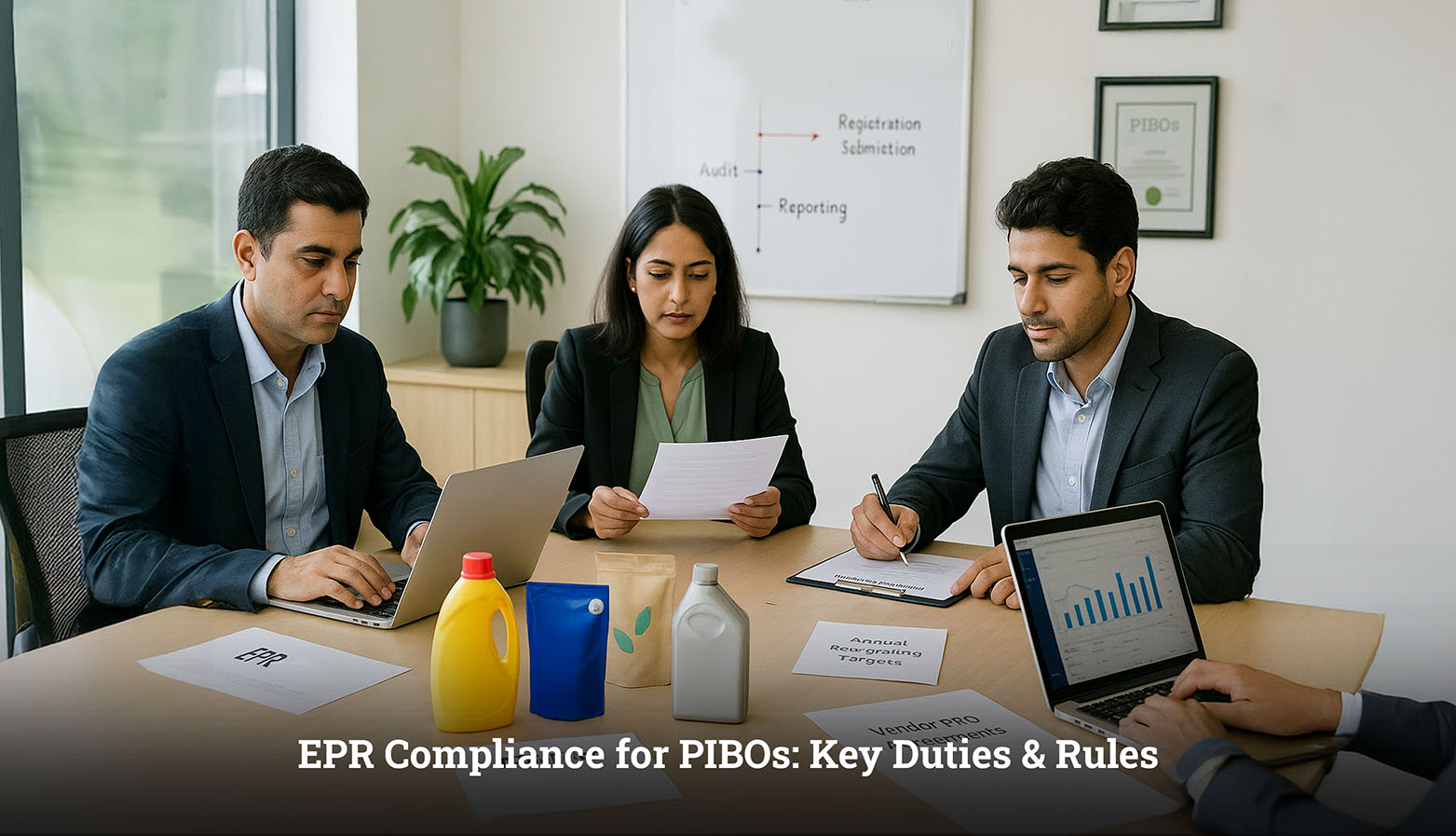
 What Is Plastic Density & Why It Matters in Recycling
What Is Plastic Density & Why It Matters in Recycling How Waste Pickers Play a Crucial Role in Recycling
How Waste Pickers Play a Crucial Role in Recycling Why Burning Plastic Is Unsafe and Recycling Is the Better Solution
Why Burning Plastic Is Unsafe and Recycling Is the Better Solution Why “Design For Recycling” Matters for Companies
Why “Design For Recycling” Matters for Companies Why Soft Plastics Are Problematic & Hard to Recycle
Why Soft Plastics Are Problematic & Hard to Recycle